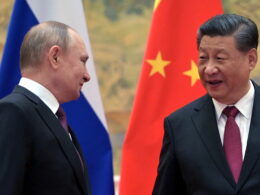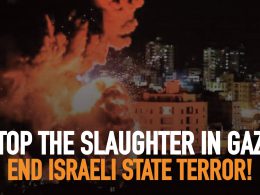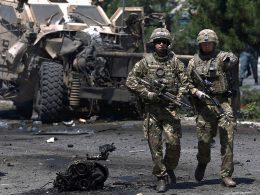Protests sparked by an anti-Islam movie trailer made in the US have spilled over more than 20 countries across the Middle East, Africa, South East Asia, countries with important Muslim communities, as well as a few other parts of the world. While a number of these marches – mostly aimed at American embassies and symbols – were peaceful, in several places they turned violent, leaving around a dozen people dead and hundreds injured.
“Innocence of Muslims”, the film which initially triggered the anger, is an amateurish, racist and provocative video, stirring up anti-Muslim prejudices. On the occasion of the anniversary of 9/11, a public ‘trial of the Prophet’ was also organized by a US evangelical and anti-Islam campaigning group. This group notably includes the notorious Terry Jones – a Christian fundamentalist pastor whose ‘legacy’ includes having triggered deadly riots in Afghanistan, last year, by burning a copy of the Koran – who also promoted the movie in question.
Of course, Marxists are not against the right to challenge and criticise religion. We stand for the right to satirise all religious ideas. We oppose anti-blasphemy laws which can be used to muzzle freedom of thought and expression, which some obscurantist forces are trying to promote, by using the recent controversy as a pretext.
We oppose, for example, the bill introduced in Tunisia’s Constituent Assembly by the country’s ruling party Ennahda, intended to criminalize the offending of ‘sacred values’. In the same way, we oppose measures such as the recent imprisonment, by a local court in the southern town of Sohag in Egypt, of a Coptic Christian teacher to six years in prison for blasphemy, which includes two years for ‘defaming the president’.
But this does not relieve us from having to denounce the completely reactionary character of this American movie. The intention behind its production is evidently islamophobic in character: the idea is to offend as many Muslims as possible in the shortest time possible, inciting religious hatred by crudely painting an entire community, through the figure of its Prophet, as gratuitously violent, barbaric and stupid.
The explosion of fury seen in the recent days in many parts of the world reflects an elementary anger which animate sections of the masses, bringing onto the surface the deep, underlying feelings of long-standing humiliation caused by the policies of US imperialism in the neo-colonial world, made up of decades-long resources-looting, occupations, support for client-dictatorships, sanctions, coups and spreading death, misery, torture and sectarian divisions in many places of the world, and the Middle East in particular.
On the other hand, right-wing forces based on political Islam and fundamentalist movements of different types seek to take advantage of the recent movie provocation to push their extremist agenda. Religious regimes and various sectarian forces are using this issue to flex their muscles, adding to the threat of further regional conflagrations, in the Middle East and beyond. This is taking place in an already explosive situation, marked by the spilling over of the Syrian war into neighbouring countries, the renewal of sectarian attacks in Iraq, and the menacing imperialist war clouds gathering over Iran.
Divide and rule
Especially since the 9/11 terrorist attacks, anti-Islam propaganda has been whipped up in the US and in other Western countries by layers of the ruling class as a weapon to divide and rule, playing on fears in order to push one part of the working class against another. Right-wing populist politicians have constantly stigmatised Muslims as one homogeneous community, full of would-be terrorists and jihadists. This provided an ideological justification to the bloody invasions of Iraq and Afghanistan, as a new enemy was needed to justify imperialism’s military adventures in the Middle East.
Yet, a recent American study organised by the official ‘Triangle Centre on Terrorism and Homeland Security’, calls terrorism by Muslim Americans “a minuscule threat to public safety”, finding that of the 14,000 homicides recorded in the US in that year, “not one was committed by a Muslim extremist”.
The ‘clash of civilisations’ doctrine, portraying the main contradiction in society as being between ‘retrograde’ Islamic values and western ’modern’ civilisation, became fashionable in right-wing circles, the media, and a new layer of so-called intellectuals. Cynically, these are often the same ‘modern’ people who justify a system which keeps entire parts of the neo-colonial world in a state of under-development, dire poverty, illiteracy and hunger.
This reactionary idea finds its ‘mirrored’ version in the principles guiding political Islamic fundamentalists, i.e. that the Muslim community must stand as one unique bloc, poor and rich alike, against the miscreants, the secular and atheist perversions coming from the Western world. Both logics tend to deny the existence of social classes in society, and to divert the struggle of the oppressed and enslaved of the world into a battle against other cultures, a diversion and division from which the capitalist elites and oppressors of both sides can only benefit.
Reaping the seeds
The support by Western imperialism for so-called ‘secular’ dictatorial regimes (such as Ben Ali’s Tunisia or Mubarak’s Egypt) was justified on the basis that they were the only possible ramparts against the danger of Islamic fundamentalism. This helped to hide the real intentions of imperialist countries teaming up to loot the wealth of already impoverished societies, for the benefit of their banks and multinational corporations.
The unconditional and long-standing support of the US ruling class for the Saudi dictatorship, based on the most reactionary brand of Islamic fundamentalism (Wahhabism), clearly illustrates that the US government never had any principled aversion to movements based on the worst expression of political Islam, or any consideration for democracy or human rights.
When their strategic interests were at stake, the US has not hesitated to support and encourage fundamentalist movements – such as the Afghan mujahideen in the 1980s against the USSR. Interestingly, many of the Salafist and Jihadist groups who have come to the fore in some of the recent clashes against US embassies are notoriously supported and funded by the Saudi and Qatari petro-monarchies, both close US allies. In Libya, they benefited from NATO’s support during the anti-Ghaddafi military operations, and are now backfiring in imperialism’s face.
Revolutions
The revolutions that erupted in North Africa and in the Middle East about two years ago have exposed the hypocrisy of imperialism, by showing to the world the deep hatred of the masses for the dictatorial regimes in the region. At the same time, it has put the logic of fundamentalist groups and their methods under serious test, by revealing the powerful force for change that the collective action of the organised working class represents.
Faced with regime changes in Tunisia and Egypt that they had not predicted, and with the threat of other regimes following suit, the Western powers were suddenly forced to take a sharp turn. They began looking for all sorts of alliances with their enemies of yesterday. Among others, representatives of the Muslim Brotherhood were invited to Washington, Ennahda’s leaders were embraced in Paris, and ‘moderate’ political Islam became suddenly an acceptable replacement for Western imperialism’s deposed dictatorial friends.
Through the NATO intervention in Libya, the imperialist powers wanted both to curb the spreading revolution and to portray themselves as ‘liberators’ and ‘saviours’ of the Muslim masses. They hoped they could turn around the anti-American imperialist feeling running deep in the region due to their continued hypocritical role and support for authoritarian and corrupt rulers, and erase from memory their erratic role when the so-called ‘Arab Spring’ kicked off.
Only a spark that lit the fuse
The recent protests and violence against US embassies have exposed the complete failure of such a policy, something the US ruling class is trying to turn a blind eye to. A White House spokesperson, Jay Carney, commented: “It [the recent violence] is in response not to United States policy, not to the administration, not to the American people. It is in response to a video…”. This is very convenient explanation for imperialism, but difficult to accept.
Protests erupted in some countries where access to the video is blocked – such as in Pakistan. This, and the fact that protests focused on US embassies when the US government has no formal responsibility for the production of this film- indicate that what drove the rage of protesters goes much beyond this particular video. These protests would not have taken off in this way if there was not widespread discontent among the Muslim masses with US imperialism and its allies in the region, especially the Israeli regime, and its oppression of the Palestinian population.
The high-profile speech that Barack Obama delivered in Cairo in 2009 was supposed to announce a reversal of the Bush administration’s policies towards the Middle East. Instead, we have seen support for brutal dictatorships, a military intervention in Libya that killed up to 30,000 people and left the country in the hands of competing armed militias, and a steady escalation in drone strikes and extra-judicial killings in countries such as Afghanistan, Pakistan, Yemen, and Somalia. Events such as the incineration of scores of Korans by American soldiers in Afghanistan have only added insult to injury.
According to a June 2012 Pew survey, just 15% of the population in predominantly-Muslim countries held a favourable opinion of the United States, compared to 25% in 2009. This is the backdrop against which the recent events have taken place. It also gives a hint of the inflammatory consequences that a US-backed military attack on Iran could potentially provoke in the region.
Political Islam
The revolutionary and counter-revolutionary process in North Africa and the Middle East over the course of the last two years has completely changed the whole region, with unprecedented changes unravelling over a whole series of countries.
A complex mixture of different cross-currents and rival forces based on political Islam have exploited the recent controversy to strengthen their own position in the region, reflecting the ongoing power struggle which is taking place, in a rapidly changing and charged landscape. The recent demonstrations have fit into that process, showing the broader tensions which have built up, drawing of the lines of further possible conflicts.
In Lebanon, Hassan Nasrallah, the General Secretary of the Shiite Hezbollah, appealed for a week of protests around the country, and an urgent meeting of the Arab League to adopt a resolution “to prohibit insults to religions”. This must be understood as a manoeuvre to try and mend its growing internal difficulties and international isolation.
Since its stance against the Israeli invasion in 2006, the ruling Hezbollah has seen its popularity undermined, because of its alignment with the pro-Assad camp in the Syrian conflict, but also because of its failure to meet the pressing day-to-day social and economic needs of the majority of the Lebanese working class.
Salafism
Among Sunni forces, the Salafist trend (an ultra-conservative, fanatical version of Sunni Islam) in particular, has grown in influence in the recent period, with different nuances and variations, in a number of countries of North Africa and the Middle East, while making inroads into the Sahel region.
In Egypt, the video of the movie trailer was initially brought to light by ‘al-Nas’ network. Al-Nas is owned by a Saudi businessman and promotes Salafism, whose political wing, An-Nour, has emerged as a challenger to the right flank of the Muslim Brotherhood, and got 25% in the country’s parliamentary elections last year.
The Salafists want to impose a new political and moral order based on 7th century religious traditions; fighting for gender segregation and a strict application of Shariah law. They use regular street violence against anything they consider ‘blasphemous’: physically attacking women, ransacking bars selling alcohol, firebombing trade union offices, destruction of cultural sites, etc.
Propped up in particular by the Saudi regime – which uses them as proxy forces in the increasingly sectarian civil war taking place in Syria – the visibility of Salafist groups has also been facilitated by the end of the iron fist previously hanging over their heads in countries such as Tunisia, Egypt or Libya.
In Tunisia and Egypt, the Salafists’ rise is intimately associated with the absence of a mass working class alternative which could drive the revolutionary struggle towards successful conclusions. As the colossal amount of anger which exists among the working masses has, so far, not been able to be directed towards a genuine socialist alternative that can bring real change in their lives, such forces try now to exploit the frustrations and the religious emotions of the most backward layers of the population to push their reactionary agenda to the forefront.
The social destitution and complete alienation of some sections of the youth and the urban poor, and the boiling of resentment against ‘the West’ – associated both with the policies of imperialism and with living standards they see as out of reach – combined with the lack of an alternative to transform the situation, provides a breeding ground for the Salafists. These desperate layers find an outlet to their rage in religious extremism and violence, occasionally painted with some ‘anti-imperialist’ rhetoric.
The rise of the Salafist movement represents a serious menace for the organised working class movement and the Left in general. Ultimately, they are nothing less than another weapon to crush the resistance of the working class and other layers of society who want to change the world in a progressive direction. They can only be fought by a programme capable of eliminating the terrain on which they build their influence, uniting the working class and the poor around the objectives of ending up poverty, mass unemployment, women’s oppression and the social backwardness in which capitalist and feudalistic relations keep important section of the masses.
Warning
The rising tide of religious extremism expressed in some of the recent clashes is a warning of what could develop on a broader scale if a movement based on the unity and independent organisation of the workers and the poor does not take the upper hand and turn the burning anger into progressive, i.e. socialist, channels.
In many countries of the region, the ruling regimes themselves have tried to use the recent controversy over the anti-Islam movie in an attempt to shore up their support, either by stepping aside and letting demonstrations against the US go ahead, or by taking the initiative themselves in fear of losing control.
Losing support because of their failure to respond to people’s aspirations, the exploitation of religious sentiments is also being used as a tool by a number of regimes to curb mounting working class’ opposition to their rule, and to try and unify the nation on the basis of religion to divert attention away from social concerns and the class divisions which exist within their countries.
This is being clearly shown by what is happening in Ramallah, in the West Bank, where the religious appendage of the Palestinian Authority has organised protests against the anti-Islam movie. This is a clear move aimed at trying to divert the anger away from itself, just after an unprecedented series of social protests and mass strike actions challenging its rule all over the West bank.
Class struggle
Pro-capitalist media have extensively covered these anti-US protests. Yet some working class-based mobilisations in the same countries, sometimes of much greater proportions, met with complete silence in the same media, such as the fresh wave of strikes in the education and transport sector in Egypt.
In the same way, the action at the US embassy in Tunis last Friday still looks relatively small compared to the large mobilisation of workers, youth and unemployed which took place during the hardly reported general strike in the Sidi Bouzid region just one month ago. Likewise, much has been commented about the thousands-strong anti-US marches in Bangladesh, but very little on the much bigger demonstration of over 100,000 garment workers which took place there on Sunday, demanding a reduction in their working hours. This shows that the vast majority of the population remains mainly preoccupied by everyday social injustices created by capitalism.
Not just reactionary bigots
The actions perpetuated by small groups aimed at destroying embassies will not in any sense weaken the position of US imperialism. Quite the contrary. This is clearly shown by the armed attack on the Libyan embassy, which was soon followed by the deployment of a reinforcement of US marines in that country.
While it would be wrong to play down the role that counter-revolutionary forces of this type have been playing in the recent incidents, as well as the counter-productive character of their actions, this is not the end of the matter.
Indeed, the anti-US protests, in their initial stages, did not involve just one bloc of reactionary religious fanatics wearing black Salafist flags or chanting slogans in support of Bin Laden. In most cases, they also involved a certain layer of ordinary people and youth, to varying degrees in different cases.
In Egypt, for example, many working class youth turned up at the street protests in Cairo, seizing on the occasion to demonstrate their rage at the American government and its support for the hated Egyptian military, seen as the guardian of all they have been fiercely fighting against for months on end.
The press agency Reuters even mentioned a Christian protester present in the first demonstration: “I am here because I am Egyptian and reject anything that insults Islam or anything that sparks division in Egypt”, he said (Reuters, 11/09/12). Religious divisions between Christian and Muslim communities have indeed been regularly stirred up by counter-revolutionary forces, in episodic attempts to break up the revolutionary unity forged among the working and poor masses during their revolution.
Interestingly, reports from Egypt also refers to protesters objecting to the ‘US flag-burning’, which tends to give the protests an indiscriminate anti-American character, irrespective of ordinary American people who disagree both with the policy of their government and the abusive content of the anti-Muslim movie.
In Benghazi, a Libyan protester was quoted saying: “We were normal people, without weapons, who came to express their anger. And then suddenly at the moment we were leaving, I saw guys in a pick-up truck equipped with RPG’s. That’s when the mood completed changed.” (Le Monde, 14/09/2012).
Examples like this are important to point out that not all the people present in these protests necessarily identify themselves with some of the blind, destructive acts of violence which there have been, or with the right-wing Islamist forces which have stepped in.
A socialist standpoint
The imperialist governments have insidiously stirred up racism to divide the working class, while pursuing their decades-long agenda of neo-colonial oppression in many areas of the world with important Muslim populations.
On the other hand, right-wing political Islam, in all its various forms, offers absolutely no way out to the oppressed peoples of the Middle East, Africa, or Asia. Many corrupt regimes and ruling elites in predominantly-Muslim countries are seizing on the recent religious controversy to influence the balance of power on a national or international level, sometimes at the cost of seriously aggravating the risk of religious and regional conflicts. The poor, the workers and the youth will pay the heaviest price for this. This is clearly indicated, for example, by the massive flood of refugees fleeing the atrocities of the Syrian civil war.
In fact, these various regimes only represent their own interests and do not stand for the well-being of working-class Muslims anymore than the forces they pretend to denounce.
Christian bigots in the West try to blame Muslims for wanting to “destroy democracy”, while reactionary Jihadist groups, such as Al-Qaeda, openly call for the killing of any Westerners present in their country. Religious fundamentalism, wherever it comes from, is ultimately nothing less than another weapon to fool the oppressed and to channel their social frustrations into a dead end.
All ignore the class divide which exist in society, and without making the slightest distinction between ordinary working class people and their respective ruling classes. They feed division and contributing to push the blame away from the real oppressors: the rich and corrupt elites who exploit working people all over the world, and use the religious sentiments of the masses to perpetuate their rule.
Through this confusing mixture, the starting point of a socialist programme must be to stand for working class unity. In order to achieve this, genuine Socialists defend the right of everyone to choose, believe and practise one’s religion freely, as well as the right to not believe at all. We acknowledge equal rights for all religious currents and minorities, i.e. refusing any discrimination based on religion, standing firmly against any obstacle on the road to the building of the most powerful workers’ unity against the capitalist exploiters.
An Egyptian protester holding a placard reading ’no to sectarian strife’ during a protest
Marxists stand for an international and united struggle of all workers and oppressed: Atheist, Sunni or Shiite, Catholic or Protestant, Buddhist, Hindu or whatever their religious beliefs or background, their gender, ethnicity, language, sexual orientation or colour of their skin. Our aim is to eliminate capitalism, the root cause of poverty, religious oppression, racism and imperialist wars, and to replace it with a democratic socialist world, free of all the scourges which grow on the basis of a rotten and decaying economic system.












